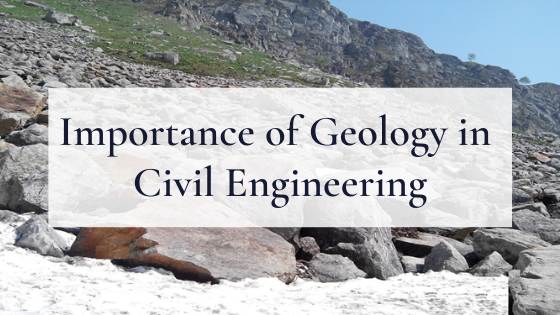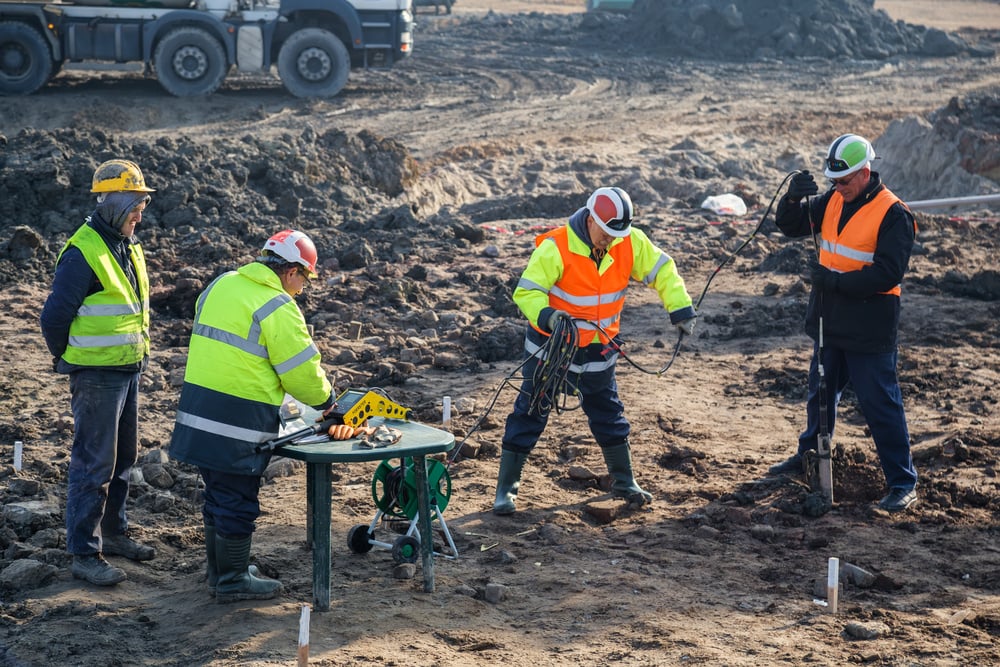Getting The Specialized Geotechnical Engineering Solutions To Work
Getting The Specialized Geotechnical Engineering Solutions To Work
Blog Article
Rumored Buzz on Specialized Geotechnical Engineering Solutions
Table of ContentsSpecialized Geotechnical Engineering Solutions for DummiesThe Best Strategy To Use For Specialized Geotechnical Engineering SolutionsEverything about Specialized Geotechnical Engineering SolutionsThe Single Strategy To Use For Specialized Geotechnical Engineering Solutions
They conduct site examinations, accumulate examples, carry out research laboratory tests, and examine information to evaluate the suitability of the ground for building projects. Based on their findings, geotechnical designers provide referrals for foundation style, slope security, preserving frameworks, and reduction of geotechnical risks. They work together with various other professionals, such as designers, architectural designers, and building and construction teams, to guarantee that geotechnical considerations are incorporated into the overall job design and execution.
Structure Style: Geotechnical designers play an essential duty in making foundations that can securely support the designated framework. They analyze the soil problems and lots demands to identify the ideal structure type, such as superficial foundations (e.g., footings), deep structures (e.g., stacks), or specialized methods like dirt improvement. They take into consideration variables such as settlement limits, birthing ability, and soil-structure communication to establish optimum structure designs.
The Ultimate Guide To Specialized Geotechnical Engineering Solutions
Below are some sorts of geotechnical engineers: Structure Designer: Foundation designers concentrate on making and evaluating foundations for structures - Specialized Geotechnical Engineering Solutions. They examine the soil problems, load needs, and website features to identify the most suitable structure kind and design, such as superficial foundations, deep foundations, or specialized techniques like heap structures
They do area testing, collect examples, and evaluate the collected data to define the dirt properties, geologic developments, and groundwater problems at a website. Geotechnical Instrumentation Designer: Geotechnical instrumentation designers concentrate on tracking and gauging the behavior of dirt, rock, and frameworks. They mount and keep instrumentation systems that keep an eye on variables such as dirt negotiation, groundwater degrees, incline motions, and structural displacements to evaluate efficiency and provide early cautions of prospective concerns.
In the office atmosphere, geotechnical designers use specialized software program devices to perform calculations, produce designs, and evaluate data. Specialized Geotechnical Engineering Solutions. They prepare reports, review project specs, communicate with clients and staff member, and coordinate task tasks. The workplace setup gives a helpful setting for study, evaluation, and cooperation with other experts associated with the project
They regularly see task sites to conduct site investigations, examine geotechnical problems, and gather information for evaluation. These brows through entail traveling to different locations, occasionally in remote or tough surfaces. Geotechnical designers might do soil tasting, conduct examinations, and monitor building and construction tasks to make sure that the geotechnical aspects of the job are being carried out properly.
6 Easy Facts About Specialized Geotechnical Engineering Solutions Explained
Geotechnical designers likewise function in specialized geotechnical labs. Geotechnical lab designers function thoroughly in these atmospheres, managing screening tools, operating tools, and taping data.
Keeping Walls: Developing wall surfaces that hold back recommended you read dirt to avoid landslides and give security on sloped terrains. Embankments and Earthworks: Designing embankments for roads, railways, and dams to guarantee they continue to be steady under stress. The mining market depends heavily on geotechnical design to make sure the safety and long life of its procedures.
With this in mind, we have actually made our program to prepare trainees for success. The Geotechnical Engineering program at the College of Delaware provides chances for sophisticated study and research study in: Dirt and rock mechanics Soil-structure communication Constitutive modeling Computational geomechanics Foundation and planet structures design Ground enhancement Incline security and landslide stablizing Liquefaction of soils and earthquake engineering Research laboratory characterization of geomaterials and soil support click to find out more Ecological geotechnics Given the strong requirement for renovation to our nation's infrastructurethe American Society of Civil Designers offered the united state
Geotechnical engineering is a branch of civil engineering; however, it involves utilizing scientific methods and principles to accumulate and translate the physical homes of the ground. Geotechnical designers are associated with all stages of the style of frameworks, from idea to building. Their job is necessary in the style and preparation procedure as they examine the honesty of soil, clay, silt, sand, and rock, before building starting.
Getting My Specialized Geotechnical Engineering Solutions To Work
This is followed by a ground examination based on the findings of the workdesk research study and includes test matching and sampling to uncover any kind of prospective problems. Geotechnical engineers work within multidisciplinary teams, supported by intermediate and junior engineers in addition to by CAD professionals. As a senior geotechnical designer on a hydro plant project, jobs may include joining technological evaluations (e.g., peer evaluations), tailings clog assessments, dam security evaluations, and other research studies connected to the design and building of mine waste facilities.
While some experts are experts entirely in geotechnics, others may function under titles like design rock hound or ground designer within similar capabilities. As a geotechnical engineer, you'll need to: develop and keep partnerships with clients and other specialists associated with the site, throughout each projectmaintain Going Here security requirements on site be conscious of price ramifications when you make recommendationsstudy geological maps and aerial photographs from a series of resources and from different time periodsexamine construction plans to see how practical they are based on your understanding of the siteinvestigate threats or geological risks for the sitesearch for ecologically sensitive attributes, such as landfill start to create factual and interpretive ground modelsplan area investigationsdrill and evaluate examples of bedrock, dirt, groundwater and extra materials oversee other specialists on sitesolve technological concerns as they develop, such as unexpected structures at drill sitesmonitor conditions throughout and after building and construction to see to it frameworks are secure in the short and lengthy termadd data accumulated on website to your first researchcreate geotechnical calculations, illustrations, and 2 or three-dimensional computer designs translating the datamake suggestions about the proposed use the site.
There are great deals of opportunities to satisfy new people, as you'll collaborate with a variety of experts at every website. The work can be difficult as you might be accountable for the safety and security of others while on website. There is likewise a high degree of economic duty, as the recommendations you make can have severe price effects.

Report this page